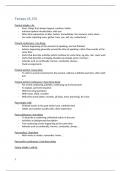Tenses (6-33)
Present simple: I do
- Facts, things that always happen, routines, habits
- Informal spoken introductions, with you
- After time expressions as after, before, immediately, the moment, until, when …
- For verbs reporting news: gather, hear, see, tell, say, understand …
Present continuous: I am doing
- Actions happening at the moment of speaking, and not finished
- Actions happening generally around the time of speaking, rather than exactly at the
same time
- Verbs that describe activities which continue for some time, eg play, rain, read, work
- Verbs that describe a changing situation eg change, grow, increase …
- Adverbs such as continually, forever, constantly, always …
- Fixed arrangements
Present perfect: I have done
- To refer to events connected to the present, without a definite past time, often with
just
- …
Present perfect continuous: I have been doing
- For recent continuing activities, continuing up to the present
- To explain a present situation
- With how long questions
- With mean, think, consider
- With time words lately, recently, all (day), every (morning), for since.
Past simple: I did
- Finished events in the past which have a definite time
- Habits and routines usually with a time expression
Past continuous: I was doing
- To describe a continuing unfinished action in the past
- Activities as background description
- Two continuing events happening at the same time
- Adverbs such as continually, forever, constantly, always …
Past perfect: I had done
- After verbs as realize, remember, know …
Past perfect continuous: I had been doing
Future simple: I will do
1
, Future continuous: I will be doing
- an event or a state at a future point
- events that have already been arranged for a future date
- very formal requests
Future perfect: I will have done
Future perfect continuous: I will have been doing
Passive (34-39)
Be + past participle
Present simple passive (are)
- The machines are controlled.
Present continuous passive (is being)
- The crime is being investigated
Present perfect passive (have been)
- A thousand new books have been published
Past simple passive (was)
- The new school was opened
Past continuous passive (was being)
- The man died while he was being taken
Will passive (will be)
- The building will be completed
Hearsay reporting (40-45)
Introduced by a passive form of the report, either in present, simple or past simple form
with a to-infinitive.
Fox example: People know some directors have been thinking on these lines for some time.
Some directors are known to have been thinking on these lines for some time.
Rest van de oefeningen zie boek
2




